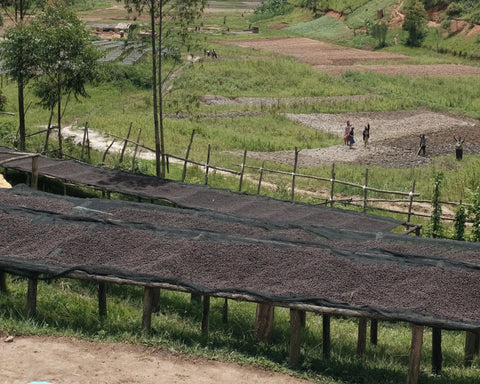Healthy soils and a push towards organic coffee production are at the center of Wakuli's sourcing strategy. And in the same way we strive to empower farmers through quality and entrepreneurship, we aim to make small holder farmers less reliant on the use of chemical fertilizers and pesticides. In that light, our attention was drawn to this article about a rather disturbing development in the realm of fertilizers and biologicals. And even though it seems only distantly related to your cup of (specialty) coffee, the truth is the link is quite strong and worrying.
“Farmers are made even more dependent on external inputs and organic farming is at great risk because of genetic modification and the patenting of microbes and bacteria” Ruben Borge, soil expert, owner of Rockin Soils and Wakuli’s partner in several regenerative projects.
Chemical fertilizers and pesticides in the coffee industry
Just like in the coffee industry, the world of fertilizers and pesticides is dominated by a handful of powerful giant corporations like Bayer, Syngenta and Monsanto. They have been in power for 70 odd years and rose to dominance in a period when increasing global food production was the number one concern. Ecological degradation, carbon emissions and freak weather patterns were not. But even during the early days of use of chemical fertilizers, there were experts warning against them and arguing that the fragile balance of microscopic life in the soils would be destroyed. More importantly, they argued that there were alternatives through a more holistic (regenerative) approach.
Like in many industries, the force of big money drowned out those kinds of arguments almost completely. The result? A global coffee industry hooked to chemical products and depleted soils that have virtually no life left in them. A direct consequence is the constant need for chemical pesticides to battle pests and diseases battering the weakened crops, produced by farmers who have been trained to follow “chemical giants” protocols.

Challenge to organic farming today
We know. It's depressing. The good thing is that more and more light is coming through the cracks. Slowly, experts on organic pest management and crop enhancement are gaining traction. Consumers are becoming aware of the negative effects of pesticides and chemical fertilizers. Costs for these products are skyrocketing, and regenerative alternatives like compost and the use of fungi are no longer fringe (hippie) concepts.
So what do the big chemical concerns do in light of their waning power? They buy up small companies working on biologicals, and they add an important ingredient to their mix: genetic modification. If they can modify, enhance and most importantly patent microbes, bacteria and fungi, they can take away the development of farmer-empowering, nature inclusive farming from the growing “regenerative agriculture” community and make it work in their advantage once again.
“There is no way to know in advance what will be the negative side effect of spreading GM microbes in the uncontrolled way as described in this article” Ruben Borge, Rockin Soils
Wakuli's stance on fertilizers and pesticides in coffee
Apart from the unknown and eerie risks of altering the smallest living organisms on earth and setting them loose in our soils, this development takes away the power from the most important actors: farmers, experts and sustainable brands. Wakuli’s whole model is based on belief in empowerment of farmers and setting up transparent value chains with traceable, sustainably grown, high quality products. Therefore, we will be keeping our eye on this troubling development, and we will work closely with farmers and experts and try to prevent the next stranglehold of these chemical corporations on the most vulnerable.
Wanna help change the coffee industry? Start with a cup of damn honest (and tasty) cup of coffee.
Try our starter pack and find your new favorite coffee.

![The Wakuli Giftcard [Digital]](http://www.wakuli.com/cdn/shop/files/IMG_0014_185aaf71-12c8-4d92-ba6b-ed1b24f4ef23.png?v=1767864881)


![Discover Monthly Light Roast - subscription [from 225g]](http://www.wakuli.com/cdn/shop/files/Shadows-Update-11.png?v=1747665630&width=533)
![Wakuli's Full Taste Pack - single order [4X225g]](http://www.wakuli.com/cdn/shop/files/Frame_1_eb3a3ca2-924a-4121-97b1-9aec7794f03b.png?v=1767631280&width=533)